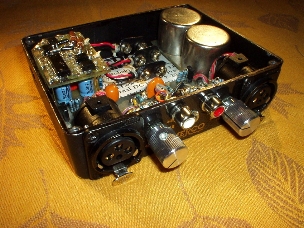
|
Instrumentation for Audio and Industry

|
Instrumentation for Audio and Industry
The AERCO MP-2 Microphone Preamp —
Specifications;
FAQs;
Photos

As you can see on the right and from the pix, it's built in a rugged die-cast aluminum case, so it's safe to bang around and very well shielded against RF interference.
It's a little over 3 x 4 x 1.3 inches and has three internal 9 volt batteries that will run a self-powered mic for ~40 hours, continuous, or a high-consumption 48 volt phantom powered mic for ~10 hours, continuous. Of course, the run times are longer with intermittent use.
The batteries are in parallel, and there is a built-in switching power converter to provide +/- 16 volts for the preamp and 48 volts for the mic, so you can also feed 9–18 volts DC in an external coaxial power jack on the side.
The external power jack is floating so you can use a positive or negative or no ground system, so it's very flexible about sharing camera or other available power.
The inputs are on gold-plated Neutrik XLR connectors, and it uses Reichenbach input transformers — the very best. Outputs are single-ended on RCA jacks because the recorder is usually very close by.
Input noise is right at the theoretical minimum (for room temperature) at -127 dBm.
Frequency response is within a half-dB from below 10 Hz to over 60 KHz. Distortion is on the order of .01% at normal levels and rises to .1% at +10 dBm at 20 Hz.
There is no problem having continuously variable gain controls, the nominal range is 50 dB. There are two options for the input transformer so you can have 0–50 dB gain for rock & roll or 20–70 dB for nature recording.
Copyright 2009 AERCO